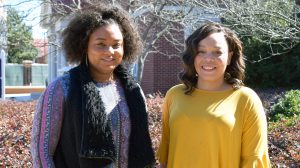
Jennifer Saxon (left) and Kristina Philips (right), both of Oxford, received a $3,000 grant from the B.A. Rudolph Foundation to fund their doctorate degree dissertation study into the factors that discourage or enhance internship participation by UM students from low socioeconomic groups. Submitted photo
OXFORD, Miss. – “Tell me and I forget, teach me and I may remember, involve me and I learn,” is a Chinese proverb that University of Mississippi doctoral students Kristina Phillips and Jennifer Saxon have explored over the past few months as they study ways to increase access to high-impact and experiential learning opportunities for more UM students.
Their research went so far as to recently catch the attention of the Washington, D.C.-based B.A. Rudolph Foundation.
“The foundation was very interested in funding this dissertation study since it is central to our mission and interests in breaking barriers related to internship participation,” said Kristen Hecht, the foundation’s program director.
Established in 2011, the B.A. Rudolph Foundation works to provide a progressive source of funding to advance and enrich the lives of women, girls and underserved populations through educational and general support that includes those seeking unpaid internships in public service and the sciences, as well as a mentorship program and networking opportunities.
“This research is an important contribution to the field, exploring these disparities and proposing meaningful solutions that will benefit the University of Mississippi and, ultimately, interns nationwide,” said Mary Bruce, the foundation’s executive director.
Phillips serves as the assistant director of college programs in the UM Division of Outreach, where she oversees the Internship Experience program for students.
The Atlanta, New York and Washington Internship Experience Program offers degree-seeking Ole Miss juniors and seniors an opportunity to gain practical work experience while earning academic credit in their fields of study. Students work, with the assistance of UM staff, to secure an internship that will give them useful professional experience to enhance career prospects upon graduation.
Phillips has worked for the department for four years. During that time, she became interested in examining the program’s enrollment patterns and determining how to increase participation for students from low-socioeconomic backgrounds.
“I wanted to explore the various factors that are holding students back from these amazing learning opportunities in the hopes to strategize solutions,” Phillips said.
“One of our objectives with this study is to examine student perspectives of the quality and nature of internships currently administered or overseen at UM and then inform administrators on how to clarify internship participation.”
Saxon, assistant athletics director for student-athlete development in the UM Department of Intercollegiate Athletics, is Phillips’ co-author and researcher.
Her primary job responsibility is to provide student-athletes with programming to prepare for life after collegiate athletic involvement and to enhance their access to gainful employment upon graduation.
“We are finding an interesting relationship between first-generation college students and their accessibility to internship experiences,” Saxon said. “Providing experiential learning opportunities for students is a component of UM’s new Flagship Forward strategic plan.
“We hope that this study can be useful as both of our campus departments work to move forward toward this goal.”
The funds awarded for the study are being used to incentivize participation from UM students into one of their various focus group discussions and pay for transcribing services for these research sessions.
So far, the research is leading Phillips and Saxon to believe that students who may need to participate in high-impact practices such as internship experiences do not do so for reasons related to socioeconomic status, race and socialization.
“The problem faced at the University of Mississippi is how to enhance internship participation for all students,” Phillips said. “The overarching goal of this study is to reduce barriers for these students and enhance participation.”
Upon completion of and compilation of their research this spring, Phillips and Saxon will complete the requirements for their Doctor of Education in Higher Education degrees and will then have an opportunity to present their findings to the board of the B.A. Rudolph Foundation in June.
For more information about the Internship Experience Program offered to students through the UM Division of Outreach, visit http://www.outreach.olemiss.edu/internships.